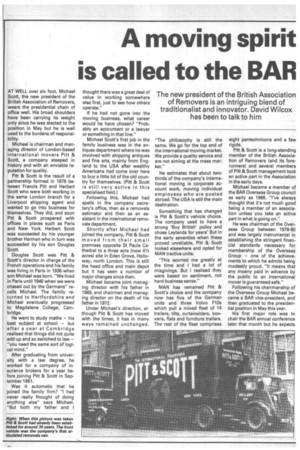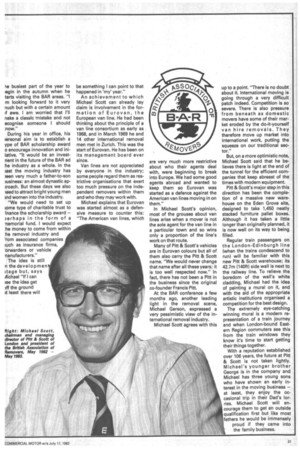A moving spirit is called to the BAR
Page 24

Page 25

If you've noticed an error in this article please click here to report it so we can fix it.
The new president of the British Association of Removers is an intriguing blend of traditionalist and innovator. David Wilcox has been to talk to him
AT WELL over six foot, Michael Scott, the new president of the British Association of Removers, wears the presidential chain of office well. His broad shoulders have been carrying its weight only since he was elected to the position in May but he is well used to the burdens of responsibility.
Michael is chairman and managing director of London-based international movers Pitt & Scott, a company steeped in history and with an enviable reputation for quality.
Pitt & Scott is the result of a partnership formed in 1876 between Francis Pitt and Herbert Scott who were both working in the same London branch for a Liverpool shipping agent and wanted to go into business for themselves. They did, and soon Pitt & Scott prospered with offices in places such as Paris and New York. Herbert Scott was succeeded by his younger brother Herman who in turn was succeeded by his son Douglas -Scott.
Douglas Scott was Pitt & Scott's director in charge of the French operations and his family was living in Paris in 1936 when son Michael was born. "We lived in Paris until 1940 when we were chased out by the Germans" recalls Michael. The family returned to Hertfordshire and Michael eventually progressed to Magdalene College, Cambridge.
He went to study maths — his best subject at school — but after a year at Cambridge realised that things did not quite add up and so switched to law — "you need the same sort of logical mind."
After graduating from university with a law degree, he worked for a company of insurance brokers for a year before joining Pitt & Scott in September 1961.
Was it automatic that he joined the family firm? "I had never really thought of doing anything else" says Michael. "But both my father and I thought there was a great deal of value in working somewhere else first, just to see how others operate."
If he had not gone into the moving business, what career would he have chosen? "Probably an accountant or a lawyer or something in that line."
Michael Scott's first job in the family business was in the antiques department where he was involved with shipping antiques and fine arts, mainly from England to the USA after wealthy Americans had come over here to buy a little bit of the old country for themselves. (Pitt & Scott is still very active in this specialised field.) Following this, Michael had spells in the company secretary's office, then as a removals estimator and then as an assistant in the international removals department.
Shortly after Michael had joined the company, Pitt & Scott moved from their small premises opposite St Pauls Cathedral to a three acre (now 41/2 acres) site in Eden Grove, Holloway, north London. This is still the head office and main depot but it has seen a number of major changes since then.
Michael became joint managing director with his father in 1969, and chairman and managing director on the death of his father in 1972.
Under Michael's direction, although Pitt & Scott has moved with the times, it has in many ways remained unchanged. "The philosophy is still the same. We go for the top end of the international moving market. We provide a quality service and are not aiming at the mass market."
He estimates that about twothirds of the company's international moving is corporate account work, moving individual employees who are posted abroad. The USA is still the main destination.
Something that has changed is Pitt & Scott's vehicle choice. The company used to have a strong 'Buy British' policy and chose Leylands for years' But in the early seventies when these proved unreliable, Pitt & Scott looked elsewhere and opted for MAN tractive units.
"This worried me greatly at the time and I had a lot of misgivings. But I realised they were based on sentiment, not hard business sense."
MAN has remained Pitt & Scott's choice and the company now has five of the German units and three Volvo F1Os which pull a mixed fleet of 14 trailers, tilts, curtainsiders, boxvans, flats and furniture trailers. The rest of the fleet comprises eight pantechnicons and a few rigids.
Pitt & Scott is a long-standing member of the British Association of Removers (and its forerunners) and several members of Pitt & Scott management took an active part in the Association in the early days.
Michael became a member of the BAR Overseas Group council as early as 1966. "I've always thought that it's not much good being a member of an association unless you take an active part in what is going on."
He was chairman of the Overseas Group between 1978-80 and was largely instrumental in establishing the stringent financial standards necessary for membership of the Overseas Group — one of the achievements to which he admits being modestly proud. "It means that any moeny paid in advance by the public to an international mover is guaranteed safe."
Following his chairmanship of the Overseas Group Michael became a BAR vice-president, and then graduated to the presidential position in May this year.
His first major role was to chair the BAR annual conference later that month but he expects le busiest part of the year to legin in the autumn when he tarts visiting the BAR areas. "I m looking forward to it very nuch but with a certain amount if awe. I am worried that I'll nake a classic mistake and not ecognise someone I should now."
During his year in office, his rersonal aim is to establish a ype of BAR scholarship award o encourage innovation and iniiative. "It would be an investnent in the future of the BAR ad he industry as a whole. In the )ast the moving industry has )een very much a father-to-son )usiness: an almost dynastic ap)roach. But these days we also teed to attract bright young men Ind women into the industry.
"We would need to set up ;ome type of charitable trust to inance the scholarship award — )erhaps in the form of a nemorial fund. I would expect :he money to come from within he removal industry and Yorn associated companies ;uch as insurance firms, 'orwarders or vehicle nanufacturers."
The idea is still n the developmen ;tage but, says Aichael "If I can ;ee the idea get )ff the ground it least there will be something I can point to that happened in 'my' year."
An achievement to which Michael Scott can already lay claim is involvement in the formation of Eurovan, the European van line. He had been thinking about the principle of a van line consortium as early as 1968, and in March 1969 he and 14 other international removal men met in Zurich. This was the start of Eurovan. He has been on its management board ever since.
Van lines are not appreciated by everyone in the industry; some people regard them as restrictive organisations that exert too much pressure on the independent removers within them and who they may work with.
Michael explains that Eurovan was started almost as a defensive measure to counter this: "The American van lines, which are very much more restrictive about who their agents deal with, were beginning to break into Europe. We had some good agents abroad and wanted to keep them so Eurovan was started as a defence against the American van lines moving in on them."
In Michael Scott's opinion, most of the grouses about van lines arise when a mover is not the sole agent for the van line in a particular town and so wins only a proportion of the line's work on that route.
Many of Pitt & Scott's vehicles are in Eurovan colours but all of them also carry the Pitt & Scott name. "We would never change that name after all these years; it is too well respected now." In fact, there has not been a Pitt in the business since the original co-founder Francis Pitt.
At the BAR conference a few months ago, another leading light in the removal scene, Michael Gerson, expressed a very pessimistic view of the international removal industry.
Michael Scott agrees with this up to a point. "There is no doubt about it. International moving is going through a very difficult patch indeed. Competition is so severe. There is also pressure from beneath as domestic movers have some of their market eroded by the do-it-yourself van hire removals. They therefore move up market into international wOrk, putting the squeeze on our traditional sector."
But, on a more optimistic note, Michael Scott said that he believes there is light at the end of the tunnel for the efficient companies that keep abreast of the times with modern equipment.
Pitt & Scott's major step in this direction has been the completion of a massive new warehouse on the Eden Grove site, designed to take 1,450 neatly stacked furniture pallet boxes. Although it has taken a little longer than originally planned, it is now well on its way to being filled.
Regular train passengers on the London-Edinburgh line (when the trains condescend to run) will be familiar with this new Pitt & Scott warehouse; its 42.7m (140ft) side wall is next to the railway line. To relieve the boredom of the wall's white cladding, Michael had the idea of painting a mural on it, and with the aid of the appropriate artistic institutions organised a competition for the best design.
The extremely eye-catching winning mural is a modern representation of a train journey and when London-bound Eastern Region commuters see this from the train windows they know it's time to start getting their things together.
With a reputation established over 106 years, the future at Pitt & Scott is not taken lightly. Michael's younger brother George is in the company and Michael has three young sons who have shown an early interest in the moving business — at least, they enjoy the occasional trip in their Dad's lorries. Michael Scott will encourage them to get an outside qualification first but like most fathers he would be immensely proud if they came into the family business.
















































